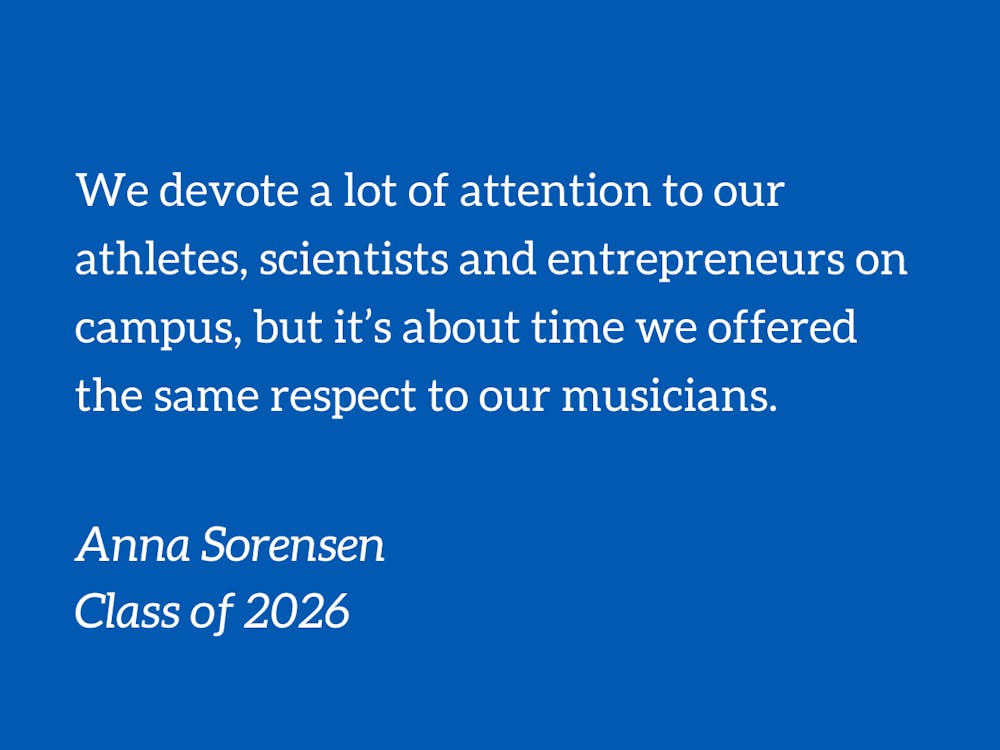Picture this: it’s a beautiful Sunday evening, you’ve just arrived back to campus after summer, and you are seated front row at O-Show as the Pitchforks serenade 150-plus students with Bruno Mars’ “Versace on the Floor.” Bold choice, certainly, but also totally awesome.
I sat in this very position freshman year, and sure enough, I returned a few weeks ago as a sophomore to revel in the Pitch Perfect spirit. I should note, I have a lot more personal investment in these shows than may be obvious. Some of my favorite memories at Duke have involved participating in and watching musical performances. I have discovered not only an incredibly high level of musical talent here on campus, but also ample opportunities to express myself and connect with the community through music.
Now, I know we can all agree that our musically-talented friends are beyond impressive, but I’m not sure we’re all aware of how much dedication it takes to pursue music here at Duke. We devote a lot of attention to our athletes, scientists and entrepreneurs on campus, but it’s about time we offered the same respect to our musicians.
At an extracurricular level, music groups across the board demand a high commitment of time and dedication. When I first got to Duke, it became clear to me early on that, despite my passion for different kinds of music, I would only have time to participate in one group. The choir I chose to join — Evensong Choir — has a relatively light schedule of three to four hours a week, which is time I am more than willing to dedicate.
On the other end of the spectrum are the highly competitive a cappella groups like Pitchforks or Out of the Blue. Auditioning for these groups is difficult enough, but that’s just the tip of the iceberg when you consider the work that comes after being accepted. Sophomore Lili Orchard, a two-year member of Out of the Blue, reports that most a cappella groups rehearse five and a half to six hours a week. During the preparation for O-Show and build-up to audition season, it’s closer to four hours every day. Additionally, Orchard describes “day-long retreats” where returning members review music for the year and new members undergo “intensive song learning.” Most acapella groups host concerts roughly every other week as well.
The work certainly pays off. Speak of the Devil is soon releasing one of their songs, and Out of the Blue is dropping an album (due imminently! Past albums include Youth in 2016 and Studio 104 in 2020). When I’ve brought this up to friends and classmates, I’ve almost always been met with surprise. To lots of people, music is a hobby or a passion, but not necessarily a legitimate college extracurricular. We tend to think of clubs at Duke as activities that “look good” on our resume, and they’re almost always limited to business-oriented or pre-professional activities.
Musicians at Duke deserve a lot more credit — literally and figuratively — beyond extracurricular groups as well. Duke offers plenty of music classes or groups to join for academic credit, but rarely does the credit earned correlate to the time and effort put in by students. Barring music majors themselves, (Music Theory classes are not a joke!) students have a range of choices through the music and theater departments; options include groups like Duke Choral, The Symphony Orchestra, applied music courses and musical theater productions.
Applied music courses like Class Piano, Class Voice, Guitar, etc. — which are graded and meet once a week — correspond to .25 credits. They have space for five to ten students and also incur an additional fee (usually around $200 per semester, private lessons are $400). I’ve always wanted to study piano, so last year I decided to sign up for class. I have loved every minute of it, but it’s definitely taken up more of my time than a .25 credit might suggest. I’ve also had to stake out the music rooms in McClendon Tower because there are only eight practice rooms (five with pianos) and access is shut off after 10 p.m.
In comparison, Duke students can sign up for free physical education classes like Golf or Pilates and earn .5 credits. While these classes meet twice a week, they require little practice outside of class time and are graded as pass/fail. Or consider House Courses, which are also pass/fail for .5 credits and only meet once a week.
Even more surprisingly, students in the Chorale or the Symphony Orchestra receive half a credit for courses that take up twice as much time as typical single-credit academic courses. Students enrolled in these groups spend at least five hours per week in rehearsal, and that’s not counting individual practice time (or as most of us call it, homework). Lexi Carr served as Assistant Stage Manager and Photographer in the Theater Studies production of Rent last spring, and earned one credit for the twenty hours per week she devoted to rehearsal. Even the most odious classes at Duke don’t measure up to these kinds of hours.
Music class credits should certainly be reviewed and redistributed. Since that’s not something the student body has much control over, the least we can do is support our student musicians. We can show up to performances the way we do for athletic games and reframe how we consider and talk about extracurriculars.
Above all, we can keep our ears open. If you listen closely, you may be able to hear the soft hums and tenor lulls of velvet-cladden men preparing to make you swoon.
Anna Sorensen is a Trinity sophomore. Her column typically runs on alternate Tuesdays.
Get The Chronicle straight to your inbox
Signup for our weekly newsletter. Cancel at any time.

